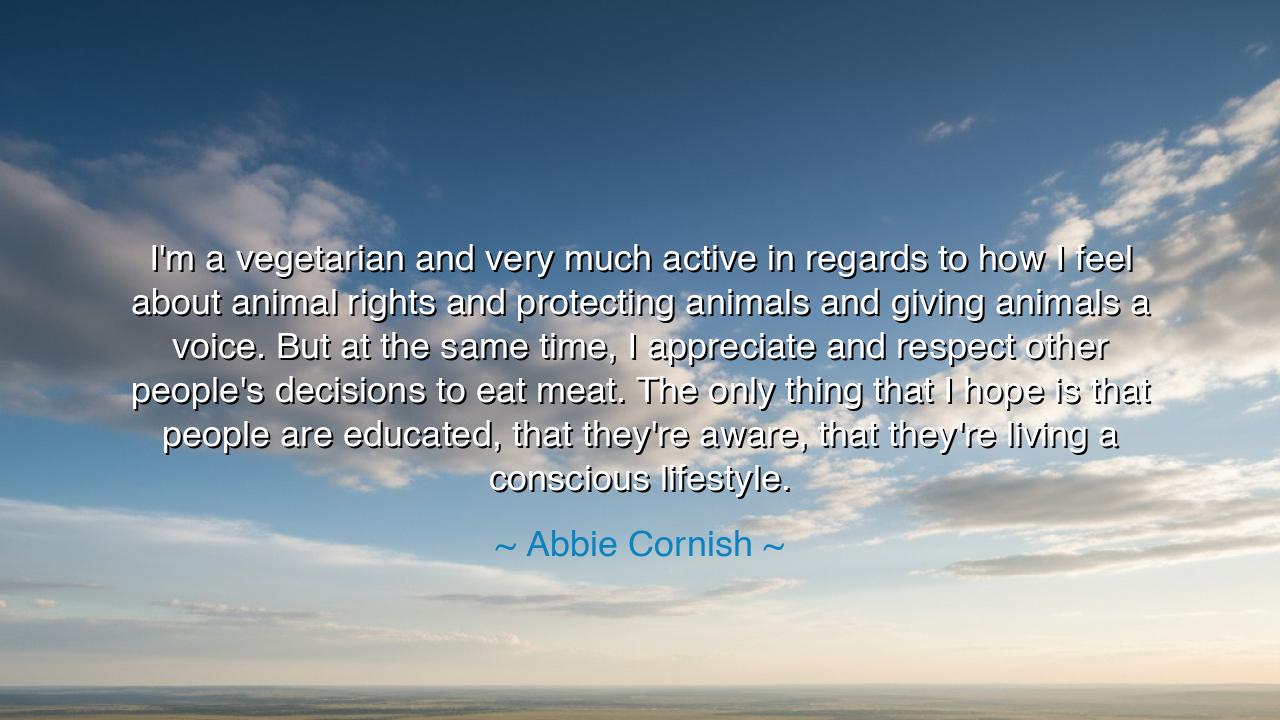
I'm a vegetarian and very much active in regards to how I feel
I'm a vegetarian and very much active in regards to how I feel about animal rights and protecting animals and giving animals a voice. But at the same time, I appreciate and respect other people's decisions to eat meat. The only thing that I hope is that people are educated, that they're aware, that they're living a conscious lifestyle.






The words of Abbie Cornish—“I'm a vegetarian and very much active in regards to how I feel about animal rights and protecting animals and giving animals a voice. But at the same time, I appreciate and respect other people's decisions to eat meat. The only thing that I hope is that people are educated, that they're aware, that they're living a conscious lifestyle.”—resound with both conviction and compassion. She speaks not as one who seeks to impose, but as one who seeks to awaken. In her voice is the balance of two ancient virtues: devotion to truth and respect for freedom. For she defends the rights of animals with passion, yet honors the dignity of human choice, asking only that choices be made with awareness and consciousness.
From the dawn of time, humans have wrestled with their relationship to the creatures of the earth. In many ancient traditions, animals were revered as sacred beings, companions of the gods, or teachers of wisdom. The Hindus honored the cow as holy, the Egyptians revered the falcon and the cat, the Native peoples of the Americas saw each animal as carrying spiritual medicine. To be a protector of animals is to step into this lineage of reverence, to see beyond the silence of beasts and give them a voice where they cannot speak. Cornish places herself in this tradition, not as judge, but as guardian.
Yet she also carries another truth: that unity cannot be built on scorn. Many who fight for causes fall into disdain for those who do not share their choices. Cornish refuses this path. She embodies the wisdom of respect: to live by one’s principles without despising others. This balance is rare and powerful. It allows her to hold fast to her vegetarian conviction while still honoring the humanity of those who choose otherwise. Such a stance is not weakness—it is strength, for it builds bridges instead of walls.
Consider the story of Leo Tolstoy, who late in life became a vegetarian out of his deep belief in compassion for all living things. He spoke of the moral awakening that came when he could no longer justify taking life unnecessarily. Yet even Tolstoy, while urging others to embrace the path, recognized that moral progress is often slow, that hearts change not by force but by illumination. His writings inspired many, not because he condemned, but because he revealed a deeper way of seeing. Cornish walks in this same spirit, hoping that by education and awareness, people will awaken to the weight of their choices.
The deeper meaning of her words lies in the call to conscious living. For whether one eats meat or not, the true issue is whether one lives blindly, consuming without thought, or whether one lives with awareness of the impact upon animals, upon the earth, upon one’s own body. The conscious lifestyle is one that asks: what is the cost of my choices? What life was given, what resources were spent, what suffering or healing was caused by my actions? To live in this way is to walk in wisdom, for consciousness is the foundation of responsibility.
The lesson is clear: you need not walk the same path as another, but you must walk your own path with awareness. To live unconsciously, without thought of consequence, is to betray both yourself and the world. To live consciously is to honor the gift of life, whether animal or human, whether earth or sky. Respect begins not in agreement, but in understanding and awareness.
Practical action lies before us: examine your habits, whether in food, in work, in consumption, or in leisure. Ask yourself if they are guided by awareness or by blindness. Educate yourself about where your food, clothing, and possessions come from. Make choices that honor life, even if they are small—choosing kindness over cruelty, stewardship over waste, compassion over indifference. And if your choices differ from another’s, let respect guide you, for only through respect can wisdom be shared and growth be nurtured.
So let Abbie Cornish’s words echo across generations: protect the voiceless, live consciously, respect freedom, and seek awareness. In this balance lies the harmony of life: the courage to stand for what is right, the humility to honor the choices of others, and the wisdom to live with eyes wide open. This is the path of true strength, and the path by which humanity may yet learn to live in peace with the creatures of the earth.






AAdministratorAdministrator
Welcome, honored guests. Please leave a comment, we will respond soon